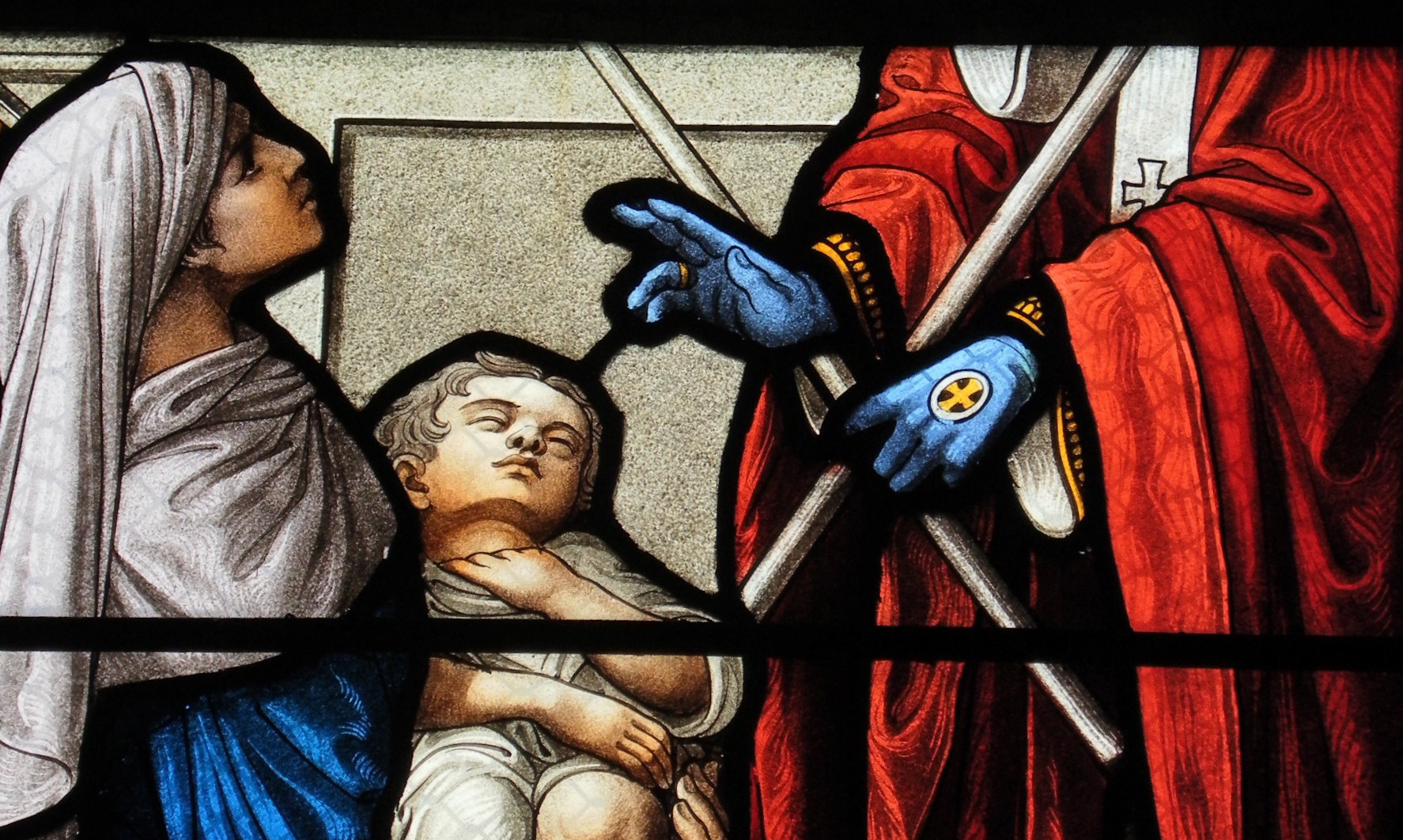An attentive Christian will pick up on many quirks in the course of the liturgical year, and today’s blessing of the throats can certainly be numbered among them.
Yesterday was a bit easier to understand. On Candlemas, the Church commemorates Christ’s presentation and dedication 40 days after His birth. It is a joyful day, one that serves as the last reverberation of the Christmas season. However, the commemoration is bittersweet; the old man Simeon, even as he rejoices to see the long-awaited Messiah, prophesies also of the sword that will pierce the heart of His Virgin Mother.
Today seems subdued when measured against Simeon’s prayer (which we sing in Compline as the Nunc Dimittis) and prophecy. What do people remember for Saint Blaise’s feast?
“Through the intercession of Saint Blaise, bishop and martyr, may God deliver you from every disease of the throat and from every other illness: In the name of the Father, and of the Son, and of the Holy Spirit.”
The Church has nothing against someone picking up a pack of Halls or (for those who are particularly penitential) a bottle of Robitussin. But St. Blaise’s Day offers its own medical treatment. The candles which were blessed yesterday and carried in solemn procession are tied together and used to bless the faithful who might be facing colds, coughs, or the horrific danger of choking to death.
Is the grace of today consistent with the grace of yesterday? Given the beautiful talk yesterday of Christ, the Light of the World, shining forth and revealing Himself for our eternal salvation, doesn’t today—focusing on the health of our throats—seem to be too worldly, too selfish, the Christian version of a health fad? Have we been distracted by secondary things?
In replying to the question of whether we ought to pray for temporal (that is, secondary) things, St. Augustine answers that it is lawful to pray for what it is lawful to desire. In commenting on this answer, St. Thomas distinguishes between praying for temporal things as ends in themselves (that is, pursuing them in a way that detracts from our relationship with God) and praying for temporal goods to help us move forward toward achieving our ultimate end (that is, God Himself). The first is disordered, the second legitimate and praiseworthy.
St. John’s Gospel provides us with an example of this after the feeding of the multitude in John 6:1-15. The people are thankful for the bread Christ miraculously provided for them, and seek to make Him a King. Granted, He is a King, but His kingship is not of this world. Their construing His effort to feed them as a sign of earthly prosperity and kingship misses the point. Christ intends to give them a more lasting remedy in the Holy Eucharist. But for those who did understand Christ’s gesture, for those who heard and received His subsequent teaching in the remainder of John’s sixth chapter on the Bread of Life, the sign of the multiplication of the loaves and fish was helpful in preparing them to receive Him.
Such is the place of these candles on St. Blaise’s day, though to a lesser degree. Like the actions of Christ Himself, the Church has taken this sign as a way to prepare people to receive a particular blessing. In her wisdom, the power of Christ’s redemption can be applied by crossed candles, just as the power of the Cross was at work in the ministration of an Armenian bishop who cleared a choking boy’s throat, saving his life. The Church sees how an ecclesiastical blessing for our physical well-being can be an instrument toward our spiritual well-being.
The Church, in her wisdom, summarized the power of the sacramentals at Vatican II:
“Thus, for well-disposed members of the faithful, the liturgy of the sacraments and sacramentals sanctifies almost every event in their lives; they are given access to the stream of divine grace which flows from the paschal mystery of the passion, death, the resurrection of Christ, the font from which all sacraments and sacramentals draw their power. There is hardly any proper use of material things which cannot thus be directed toward the sanctification of men and the praise of God.” (Sacrosanctum Concilium, 61)
Even if this sign seems more cryptic and enigmatic, the Church invites us this day to receive St. Blaise’s blessing in confidence, that our voices may praise the Lord clearly, having been freed to do so by His grace and power.
✠







